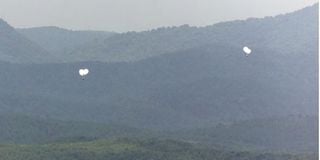Trash balloons sent by North Korea cause regular disruptions at Seoul's airports

Balloons believed to have been sent by North Korea, fly over a North Korean territory in this picture taken from an observation post near the demilitarized zone separating the two Koreas, in Paju, South Korea, September 5, 2024.
South Korea has been forced to repeatedly shut down runways at the two main airports for the capital Seoul since June due to disruption from balloons carrying trash launched by North Korea, a South Korean lawmaker said on Wednesday, citing aviation data.
On 20 different days since June 1, all or some runways at Incheon and Gimpo airports were closed for landings or takeoffs, or both, when balloons were detected in the vicinity, Democratic Party member of parliament Yang Bu-nam said in a statement.
In total, the closures lasted 413 minutes.
North Korea has launched more than 5,500 balloons with bags of trash attached to them since late May, saying it was responding to balloons carrying propaganda leaflets flown by South Korean activists.
The balloons are carried by wind and some have dropped in the South, including near the presidential office and on airport runways.
While most were removed by authorities without incident, some have disrupted airport traffic and caused small fires.
On June 26, Incheon airport runways were closed for a total of 166 minutes, the most over 24 hours, according to aviation official data released by Yang's office.
On Monday, takeoffs and landings were suspended at Incheon, the world's fifth-busiest international airport and an important cargo hub, for a total of 90 minutes.
The balloons have also disrupted operations at Gimpo, which is on the western edge of the capital Seoul and mostly serves domestic flights.
An airline official said the North Korean balloon campaign had complicated flight operations, in some cases increasing the amount of fuel carried by planes in case of delays in the air or diversions to alternative airports.
An aviation authority official said decisions to close runways were made each time a balloon is detected, factoring in conditions and not based on a specific distance they are from the airport.
South Korea's military has said it uses surveillance assets to track the balloons starting when they are launched but its position has not been to shoot them down despite calls by some MPs and civic groups, citing potential safety risks.
On Monday, the military said it was ready to take "stern military action" if it believed the North had "crossed the line", but declined to elaborate.





